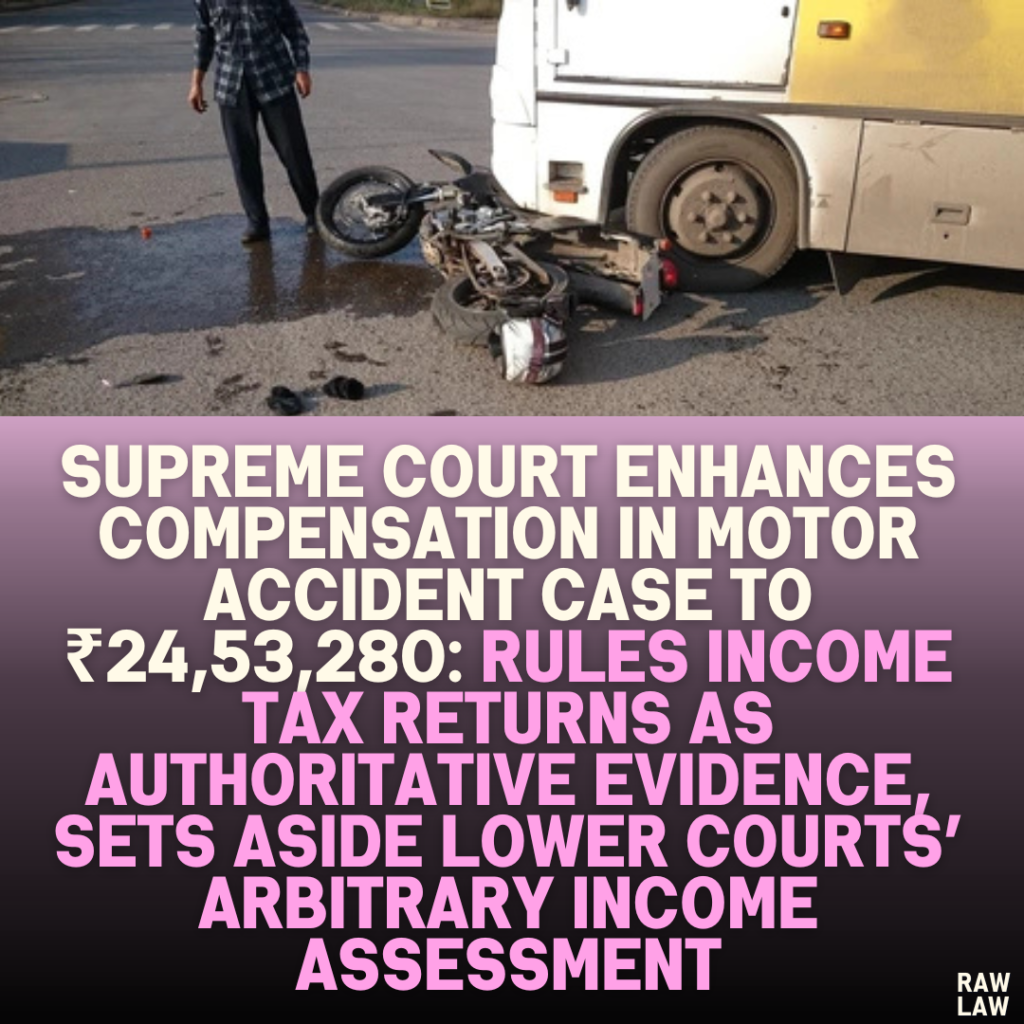Court’s Decision:
The Supreme Court allowed the appeal filed by the claimant, setting aside the compensation awarded by the Motor Accidents Claims Tribunal (MACT) and upheld by the High Court. The Court recalculated the compensation, increasing it from ₹13,91,300 to ₹24,53,280. The Court observed that the Tribunal and High Court failed to correctly consider the deceased’s Income Tax Returns, which are statutory and credible documents for determining income. Interest on the compensation was directed to be paid as previously awarded by the MACT.
Facts:
- Incident: On September 30, 2012, the deceased, a 47-year-old mechanical engineer, was involved in a fatal accident when a bus collided with his motorcycle at Kottara Cross, Mangalore. He succumbed to his injuries on October 3, 2012.
- Claim Petition: The deceased’s wife filed a claim petition before the MACT, seeking compensation of ₹1,00,00,000. She submitted that the deceased was the sole earning member of the family, earning ₹5,00,000 per annum, as evidenced by his Income Tax Returns.
- MACT Award: The MACT awarded ₹13,91,300, determining the annual income of the deceased to be ₹90,000. It applied a multiplier of 13 and included additional amounts for loss of consortium, medical expenses, and funeral expenses.
- High Court Appeal: Dissatisfied with the award, the claimant appealed to the High Court, arguing that the deceased’s actual income was ₹1,98,192 as reflected in his Income Tax Returns. The High Court dismissed the appeal, holding that the compensation awarded by the MACT was just.
- Supreme Court Appeal: The claimant appealed to the Supreme Court, challenging the denial of adequate compensation and the High Court’s observation that Income Tax Returns could not be relied upon.
Issues:
- Whether the MACT and High Court erred in disregarding the Income Tax Returns as credible evidence of the deceased’s income.
- Whether the compensation awarded by the MACT and upheld by the High Court was just and adequate.
Petitioner’s Arguments:
- Income Evidence: The petitioner argued that the deceased’s Income Tax Returns for the financial year 2012-2013 showed a gross annual income of ₹1,98,192, which the Tribunal and High Court wrongly ignored.
- Inadequate Compensation: The petitioner contended that the compensation of ₹13,91,300 was grossly inadequate, given the deceased’s profession as a mechanical engineer and his contributions to the family.
- Legal Precedent: The petitioner relied on previous Supreme Court judgments that emphasized the importance of Income Tax Returns in determining income for compensation.
Respondent’s Arguments:
- Disputing Income: The respondent argued that the deceased’s income had not been conclusively proved, and the Income Tax Returns were not reliable evidence.
- Fair Compensation: They maintained that the compensation awarded by the MACT was just and did not warrant enhancement.
Analysis of the Law:
- Income Tax Returns as Evidence: The Court reiterated that Income Tax Returns are statutory documents that should be the basis for determining the income of the deceased in compensation claims. Arbitrarily fixing income disregards established legal principles.
- Multiplier Method: The Court applied the multiplier method for calculating compensation, as laid down in National Insurance Co. Ltd. v. Pranay Sethi (2017).
- Future Prospects: The Court included future prospects in the calculation, adding 25% of the deceased’s annual income, as he was aged 47 at the time of death.
Precedent Analysis:
- Malarvizhi & Ors. v. United India Insurance Co. Ltd. & Ors. (2020): This judgment held that Income Tax Returns are credible and statutory evidence for determining income in motor accident claims.
- New India Assurance Co. Ltd. v. Sonigra Juhi Uttamchand (2025): The Court observed that income calculation must rely on tax returns, provided proper evidence of tax payments is submitted.
Court’s Reasoning:
- Error in MACT and High Court’s Findings: The Court found that the lower courts erred by arbitrarily fixing the deceased’s income at ₹90,000 instead of relying on his Income Tax Returns, which showed a gross annual income of ₹1,98,192.
- Enhanced Compensation: Based on the established legal principles and the deceased’s Income Tax Returns, the Court recalculated the compensation as follows:
- Yearly Income: ₹1,98,192.
- Future Prospects: 25% of the income (₹49,548), making the total income ₹2,47,740.
- Deductions: One-third deduction for personal expenses, reducing the income to ₹1,65,160.
- Multiplier: 13 (as per the deceased’s age), resulting in ₹21,47,080.
- Additional Heads: Medical expenses (₹1,73,100), loss of estate (₹18,150), funeral expenses (₹18,150), and consortium (₹96,800).
- Total Compensation: ₹24,53,280.
Conclusion:
The Supreme Court allowed the appeal, enhancing the compensation to ₹24,53,280. It directed that interest on the amount be paid as awarded by the MACT. The judgment underscores the importance of statutory documents like Income Tax Returns in ensuring just compensation.
Implications:
- Legal Clarity: The judgment provides clear guidance to Tribunals and Courts to rely on Income Tax Returns for determining income in motor accident claims.
- Fair Compensation: It ensures that claimants receive just compensation based on credible evidence, preventing arbitrary decisions.
- Precedential Value: The judgment strengthens the legal principle that statutory documents are paramount in compensation cases, promoting uniformity and fairness in such claims.
